
We already created a list of online courses and lessons, useful websites, language learning apps and podcasts. They will help you learn English, practice it and improve it.
By using them, in time, your English will get better and better. But, before you reach that goal, you need to get by somehow. We agreed that you don’t need to wait for your English to be perfect before you apply for online jobs.
So, what do you do in the meantime? How will you work?
Try making the most out of the various online tools, dictionaries and translators that can help you communicate and even understand the instructions more precisely.
Translating tools
Google Translate is one of the most famous translation tools. You just type or paste in the word/sentence you want to translate into the field. Google Translate detects the language, you set the target language and it offers the translation.

Google Translate does translations in both directions, but it is not always entirely precise. Just like all types of translations, even the ones done by a professional translator, the most accurate translations are those done TO the native tongue and FROM the foreign language.
Therefore, use this tool to clarify instructions that you don’t understand that well, but be careful when you use it to communicate as translations to English can be awkward. Review the translations with the tools like Grammarly or Ginger.
A similar translation tool is Bing Translator. However, for some languages, it is less precise than Google Translate.
There are other translation tools like Translations.com, Babel Fish or Babylon Translation, but they either are simply supported by Google or Bing, or they don’t offer enough languages.
Linguee works as an online dictionary, but also includes a search engine for context. This means that the translations are more reliable. However, there are only a handful of languages available.
Dictionaries
Before the Internet, if you didn’t know a word, you would look it up in a dictionary. It took some time. Today, all those amazing and renown dictionaries are freely available in their online form. It means that looking up a word today doesn’t take more than a couple of seconds.
English teachers will always tell you that the best way to go about learning English words is to use an English-English dictionary rather than those dictionaries that translate to your native language. So, here are the best online editions of famous English dictionaries.
Oxford Dictionaries is an online edition of the English Oxford Dictionary. It also includes the Word of the Day, blog posts, Thesaurus and many other interesting options.
Merriam Webster is an American English dictionary. In all other ways, it is quite similarly organised to the Oxford Dictionary.
Cambridge Dictionary is another renown dictionary that offers translations, thesaurus and articles. All this is available in the forms of smartphone apps and browser extensions. You can create your own profile and build your own word bank.
Longman Dictionary is also worth mentioning since it is one of the authoritative dictionaries of the American English language.
Dictionary.com is another online dictionary and Thesaurus with a blog post. It also comes in a form of a smartphone app.
Other Great Tools
Visuwords is a very interesting tool that will help you expand your vocabulary. It is perfect for those that love using mind-maps. You type in the word and it shows you visual representation of its semantic field.
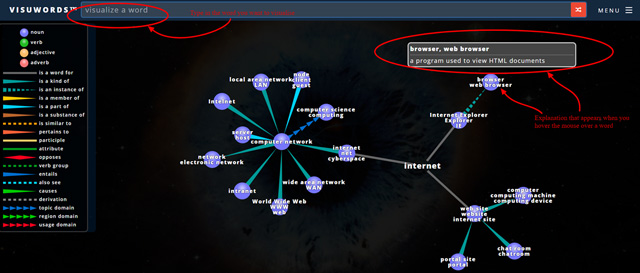
In this way, you can learn the words that are in some sort of relation with other words. It can help you remember them.
Readlang is an excellent add-on for your browser. You just go about your way and read the web pages you like. Every time you come across an unknown word or a phrase, you simply mark it. Readlang will translate it for you.
But that is not the end, it will save it for later, in the form of flashcards, so you can practice it and learn. It even supports export to Anki. You can import entire novels in plain text and work on them.
Fraze It is a quite an interesting tool. It helps you understand the way the word you choose is used and in which context. When you start typing in the words, it will make suggestions based on the great corpus of words it has.
Ozdic is a collocation dictionary. Broadly speaking, collocations are the words that usually go together. For example, you take or finish a course. You don’t look a course, do you? Therefore, take a course and finish a course are collocations. Ozdic offers these for every word you want. It will help you avoid awkward constructions and phrases.
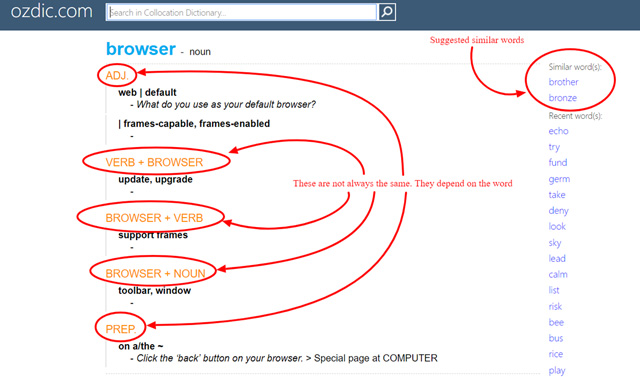
Forvo is a pronunciation dictionary. Speaking and pronunciation are not the main skills you need to master for your online career, but they are not to be neglected either.
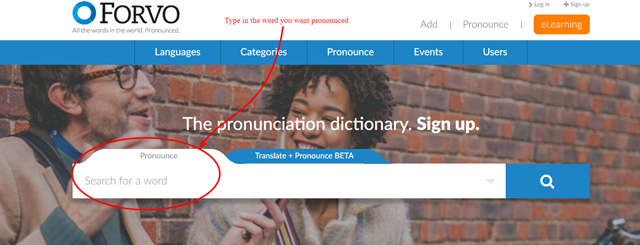
Social Media for English Language Learning
First, there was the Internet and then there were the social media! Facebook, Twitter, Youtube, Pinterest and many others rule the online world.
Usually, people consider the social media to be distractions from the ‘real world’, but if you use them well, they can help you in your mission to improve your English. How?
Well, some of them are designed for that purpose. Those are usually the social media accounts that accompany already established language learning websites and courses.
Others are just fun to read. Yes! You read this correctly! You can read up some of the Facebook groups and call that language learning!
The idea behind is – you will improve your vocabulary and grammar in an easier way if you read something that interests you. The other part of this is the way posts on social media are phrased – short, easy to read and understand.
The last, but not the least important – the language used is contemporary, lively and up to date! It is not a somewhat artificial and “bookish” language some textbooks teach. You’ll be talking like the cool kids!
YouTube
All the videos you can imagine are on YouTube. So, if you can imagine, there is much more there than just funny animal videos. There are channels that are created to help you learn English. Here are the ones that we believe will help you the most. Surely, you can easily discover more.
For example, you can learn heaps of words, watching videos that are created using kinetic typography. It is like the words are dancing in front of you, while you listen to the speaker.
Listen to the great British actor and intellectual, who is very keen on language, Stephen Fry, talking about how language doesn’t have to be 100% grammatically accurate and pedantic.
But, let’s take one step back and take a look at a couple of channels that are designed especially for the purpose of helping you improve your English language skills.
BBC Learning English is a part of the grand efforts BBC makes to introduce proper English language all over the world. The channel offers different videos. Some of them are aimed at improving your learning skills and others are aimed at improving your language skills.
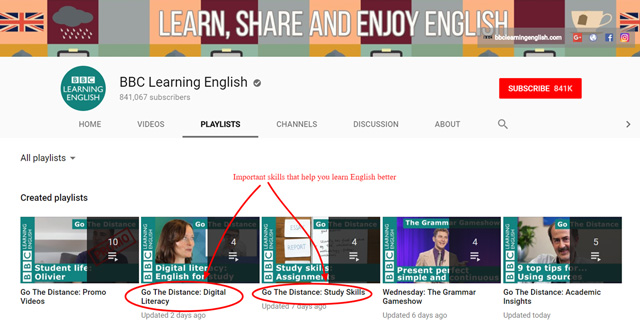
Not sure where to start? Go to the Promo Videos section and decide after watching those introductory videos first.
engVid – Learn English for Free is one of the stellar English learning channels that offers so much! You get to choose a teacher and then follow their channel, watch their videos and enjoy their lessons.
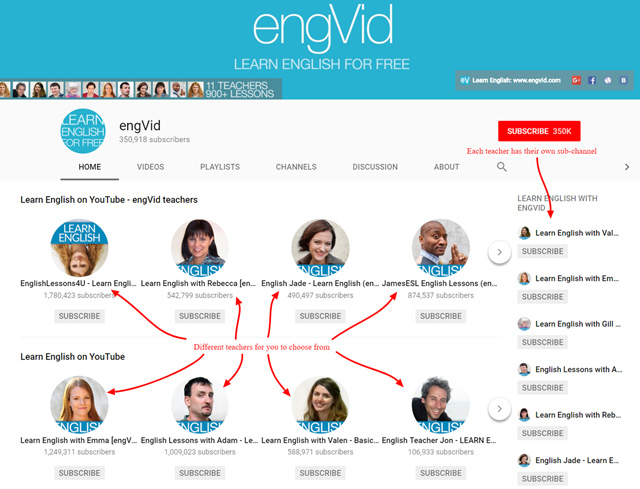
Of course, you can watch lessons from different teachers, or all of them if you like! Your access is unlimited. You have enough material here to last you a long time.
The Grammar Girl is a ‘sister’ account of the Quick and Dirty Tips account. They deal with the tricky grammar details and clarify them for the students. That’s very useful and it can be just the thing to make you level up with your English.
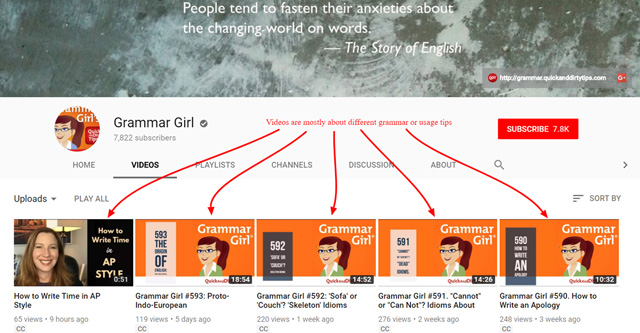
The Grammar Girl is a well-known channel and a lot of students point it out as very helpful.
Jennifer ESL caters to different levels of English. You can tell that Jennifer is not a native speaker of English, but some of the best English teachers are non-native speakers! It means she truly understands the struggles of an ESL learner since she had to go through it herself!
Go ahead and pick the videos that cater to your level of English and start improving it.
Go Natural English is another channel of a certified ESL teacher, who is also a native speaker – if that is important to you. It allows you to use the lessons freely and even to get some of them delivered into your inbox if you join the email list.
This channel is more about raising your level of English than teaching you the basics. Hopefully, that is just what you need.
Easy English – Learning English from the Streets! is a great channel for those that want to get in touch with the real, live English spoken on the streets. The entire idea behind this channel is for its creators to walk the streets and interview random passers-by about some interesting topics.
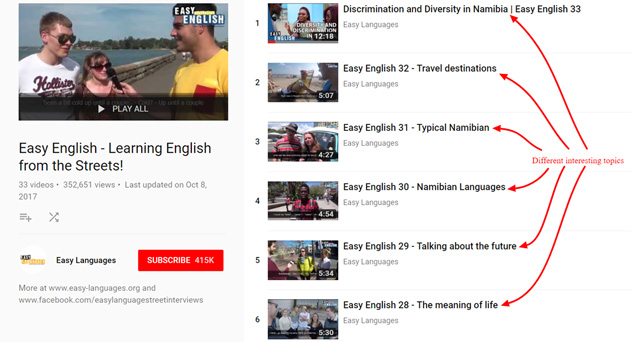
It is a great idea to use this resource to expose yourself to real English spoken by native speakers while also learning more about the culture of different people.
Fluency MC is another fun channel since this teacher raps his English lessons. Sounds fun? It is. It is also educative.
Idiom Land has tons of videos and each of them explains one of the idioms of English language. It is important to learn idioms because they are usually not easily translated into your native language.
You understand the words, but you don’t understand why it is raining cats and dogs. It just means it is raining heavily. Learning idioms and using them makes your language more colourful and proficient.
Facebook Groups
Ever got lost in the sea of comments underneath a Facebook post? We have all been there. However, make that work for you and join the discussions on the Facebook pages that can, actually, teach you English.
It will still be fun and interesting and you will also have the the chance to practice English and get answers to your questions. Your peers, native speakers or even ESL teachers will be addressing your comments and problems.
Again, we’ll start with the pages that are designed for ESL learning and then move on to those that aren’t meant for that purpose but are a great resource if you want to get some quality exposure.
My English Teacher often opens discussions and exchange of opinions on their wall and in that way entices students to converse. That is just what you will be doing on your workplace – communicating with your coworkers in a short written form.
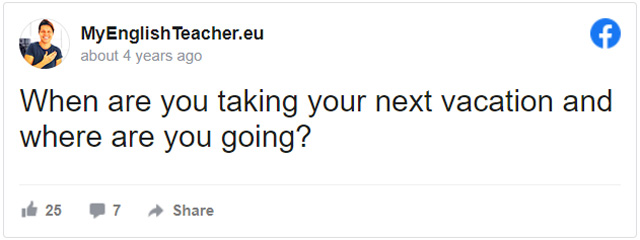
Woodward English also sparks similar conversations with their posts and offer tips about English language. They are quite responsive and help their students.
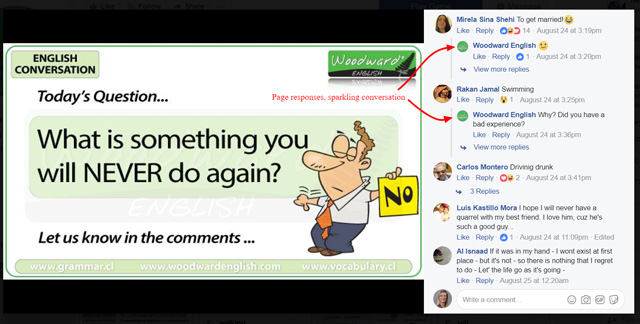
American English at State is a great page that also offers tips and clarifies the tricky grammar parts. Additionally, they have some nice, inspiring posts that make good short reading. They are about memorable dates, such as International Education Week, or some extraordinary people like Ada Lovelace.
Let’s Practice English will appeal to those who are looking form more tasks and assignments. They offer quiz questions, but also reading tasks and other, more challenging assignments, like this one, for example.
Besides the Facebook groups that are aimed at teaching you English, there are those that have completely different goals. They can inspire you to read, communicate and write more and enjoy English. Here are some of them.
Humans of New York is full of short, interesting and heartwarming stories and, as of lately, videos. The language used is simple, colourful and easy to understand. Here is an example of such a story.
Story Corps is dedicated to collecting human stories around the USA. They are enticing, exciting and beautiful. Allow yourself to get drawn into those stories and learn English in that way.
English Short Stories has a name that says it all. It is a collection of short stories that you can read, comment on or join the discussion with others that read them.
When you think about it, Twitter somewhat looks like a collection of short Facebook statuses. They include videos and images, as well. In other words, it has all it takes to be a sufficient platform for sharing ESL tips. Here are a couple of profiles worth following.
Wall Street English is a Twitter account of an ESL course that is mainly based on business English. It is packed with interesting tips and language points. You can expect interesting tweets, like this one:
Here are other ways to say BIG! #WallStreetEnglish #WSEID #LearnEnglish pic.twitter.com/bHpQuf0aQx
— Wall Street English Indonesia (@WSE_Indonesia) November 7, 2017
BBC Learn English is a Twitter account of the already mention ESL authority. It is good to follow their Twitter account, as well, since it curates the most interesting bits of all other platforms on which BBC Learn English shares their content.
English Node offers the regular types of content: tips, images, grammar clarifications, etc, but it also posts famous songs with lyrics. That can be quite useful for those that enjoy learning with music.
Kylie Minogue – Can’t Get You Out Of My Head (Lyrics) https://t.co/APxFi87HhP
— EnglishNode (@EnglishNode) November 5, 2017
English Tips 4U is just that – a lot of useful English tips. The profile is also quite responsive and they post questions, tasks and reply to those who participate in their discussions. They also post interesting facts about language:
Here are 20 oldest words in English, most of which we still use until today. Read more: https://t.co/SHyE5VlRRM pic.twitter.com/alDGQpmgGI
— EnglishTips4U (@EnglishTips4U) November 8, 2017
Business Unusual has a very good method of explaining different words, phrases and idioms. They post videos that visually represent words. That approach makes vocabulary sink into your memory much easier. You can check out their hashtag #iThinkEnglish.
To mingle with 👯♂️
👉🏻 To mix, get-together or socialize with people
📕 Group of friends mingling during the #weekend#ESL #Sunday #AI #US pic.twitter.com/FmGv2IDcrQ
— INGLESAME (@_inglesame) September 10, 2017
Espresso English offers English lessons by e-mail and a free English phrases e-book in addition to the tips and word explanations they publish in their tweets.
This is a very visual social network and you already have enough material from the suggested profiles and websites above. Pinterest can have its place in your language learning efforts. You can search for pins that deal with the most common mistakes you make or a particularly difficult idiom to remember.
You can then make a board that will help you review those later or even print some out and put it on your wall. Some of the reminders can include common phrases in business language that you just forget to use at your online workplace.
Traditional Approaches to Language Learning
Most of the above-mentioned resources and tools are designed to get you to your goal quickly – to enable you to communicate in English with your teammates and employers.
However, besides this short-term goal, you also need a strategy that will allow you to set some long-term goals, as well. Combine the traditional approach to learning English with the tricks and hacks for the best possible results.
Try Different Learning Programs
If you want to give yourself a more structured approach, you can try some of the famous learning programs. They have proven their efficacy in practice, so there is no reason why they wouldn’t work with you, as well.
When you look at the reviews of these programs online, you will often find negative reviews. It is true that this type of learning a language is a bit outdated, but the lack of success is usually due to the fact that people rely ONLY on one program and rarely do anything else to improve their language.
Not to mention the fact that this type of self-study requires iron discipline that not many people posses.
What works for you, doesn’t have to work for somebody else and vice versa. Just in case, you still want to try something like this, we are giving you the information we gathered on the most famous language learning programs.
Rosetta Stone is one of the most notable language learning trademarks. Today, it comes in digital and online forms, as well. In the beginning, it was all about the textbooks and recordings. The idea behind Rosetta Stone is that you don’t get any explanations or grammar lessons in your native language.
You get immersed in the language and you have to work it out for yourself. It takes discipline and patience, so you need to think twice before using it, since this program comes with a steep price. It also takes a lot of time to reach advanced levels of English.
Pimsleur reviews usually contain the same phrase good, but expensive. It mostly auditory and is based on listening and understanding. You can learn more about its method on their website.
Always keep in mind that these reviews are sometimes based on languages other than English and that people who used them have different learning strategies and habits than you.
If you are interested in Pimsleur courses, make sure that they offer the English course for native speakers of your native language. Their courses rely on L1, so keep that in mind.
Rocket English is highly recommended by different linguists and students. It is not as expensive as other learning programs, but it is not designed for advanced learners. Depending on your level, you may still want to give it a try. There is a 6-day trial period. Read more pros and cons about Rocket English.
Michel Thomas is probably another name you’ve heard about, but you won’t be able to find an English course unless your native language is Spanish.
Textbooks
Sounds a bit too much like school, doesn’t it? Don’t run away yet! Books have improved a lot since you went to school and language learning textbooks now come with songs, videos, games and interesting content. That is, if you pick a good one.
As a rule, it is best to use textbooks if you have lessons with a tutor, but it is quite possible to improve your language working on your own.
Now that you have an idea about what you want from a textbook, here are some of the publishers and their textbooks that our teachers like to use when they are teaching English.
Oxford University Press offers different textbook series for adult learners. It is one of the favourite textbook publishing houses among the ESL teachers.
New Headway exists in both American and British varieties and it also caters to all levels from the beginner to the advanced.
English Result is aimed mainly at those students that struggle with motivation, featuring captivating content. However, it goes up only to the upper-intermediate level.
New English File also has all levels and its main idea is to get students to speak. Therefore, it is best used if you have a teacher.
Cambridge University Press has a wide range of ESL textbooks. Take a look at English Unlimited and Touchstone and take your pick. Keep in mind that their textbooks feature levels of English up to B1, so if you want more advanced language, look further.
Pearson Longman has so many high quality textbooks, it is hard to take a pick! They cater to all levels of English, as well. But, if we had to pick one and only one textbook, we’d choose Cutting Edge.
Local Courses and Evening Classes
Of course, you want to learn English quickly and efficiently, but sometimes, it is best to go back to basics and enrol into a good, old, language class.
This is a matter of time and money and it is not for everybody. However, there are some ways to find good courses and lessons for less than a fortune. Here are some options to consider:
Government funded courses – local authorities sometimes offer these kinds of courses and you need to explore if this option exists in your local community. Sometimes, it is not government funded, but by some charity organisations.
CELTA discount courses – this is an excellent opportunity. CELTA is a course for teachers of English as a Second Language. Once they complete the course, they get the Cambridge certificate that allows them to teach ESL in the international schools.
However, in order to pass it, they need to teach, teach and teach some more. Therefore – they need students! Usually, private schools that offer CELTA training offer courses taught by the CELTA students at a discount price. Why is this an awesome opportunity?
- CELTA is based on conversations, so classes are interesting
- You get discounted courses taught by excellent teachers
- Teachers will be EXTRA prepared for their classes, since they are being graded, as well
You just need to search for the nearest CELTA training centre and ask if you can enrol as a part of a study group.
Language schools – any exposure to English is good. But, if you are already paying for an English course, make sure you are getting your money’s worth. Here are 5 questions to ask before committing to one language school.
Don’t be dazzled by modern equipment and money spent on advertising. A whiteboard and a good teacher can make up for all that!
Private tutors – you have to ‘click’ with your tutor. You are not friends with everybody you meet, are you? There’s nothing wrong with people from your office, but you don’t consider all of them to be your friends. Moreover, you like working with some of them more than with others.
The same is with language tutors. You can be fine, they can be fine, but the combination just doesn’t work. It’s not anybody’s fault, it just is what it is. That and many more factors can decide if your language learning will be successful.
Read about how to choose the right tutor.
In Summary
When you are preparing for the eCommerce career of your choice, you need to improve your English. You know that already. You need a good plan, tools, and resources to achieve a high level of English.
You know how when you want to achieve something you have the plan A and the plan B?
✔ Plan A is to improve your English ASAP and start communicating with your online team.
✔ Plan B is to have a structured approach to language improvement that will, in time, lead you to proficiency.
In this case, plan B is not here if the plan A doesn’t work. It is here to be put into practice simultaneously with your plan A.
This lesson offers different resources and tools for both of these plans. There are dictionaries, online and traditional courses and lessons, apps that teach languages and help you memorise words, websites with tips and lessons and even social media with their interactive approach.
With so many types of resources, it is impossible not to improve your language. You just need to pick the tools, combine them, be consistent about it and you’ll make it!
We also offered some ideas about how to use the traditional approaches to learning languages. You have several textbooks to pick from and several suggestions about how to find affordable language courses.
✔ The recipe for success is to find a structure that you like – an online course or even a textbook and follow it. Make sure it is interesting for you because if you don’t like the content, you will not be persistent in learning.
✔ While you are doing that, use different vocabulary building apps to help you learn more quickly. Dictionaries and translation tools are also at your disposal while learning.
✔ Since it is important that you get exposed to as much language as possible, make the most of different video lessons, podcasts and other materials. It is ESSENTIAL that you understand those videos, audios and texts for the better part. Language that is too difficult won’t help you learn.
✔ From time to time, you will hit a wall. Use different social media platforms to discuss, elaborate and look for the answers to your language-related questions. Also, use them to practice communication online. That’s how you’ll be spending a lot of your time working for an eCommerce company.
This is a learning path that will definitely work for many. The details are up to you – the type of content, whether you prefer this course to that or Facebook to Twitter.
Relax, have fun and be passionate about reaching your goal – improving your English. You have all the tools necessary to succeed!
Frequently Asked Questions
1. You have to choose one tool, course or website and stick to it.
a. True. It is important that you are consistent.
b. False. All the tools and resources can and should be combined for better results.
2. You can completely rely on online translators like Google Translate.
a. No. You can use them to get a general idea about the meanings, but they should be used carefully.
b. Yes. Their translations are flawless.
3. You should only use resources that are aimed at learning English.
a. Yes. Other material is a waste of your time.
b. No. Being exposed to different types of content is a great way of acquiring it as long as you understand some of it.
4. You should read, listen and watch as much material in English as possible, regardless of its complexity.
a. Yes. As long as it’s English, it’s good.
b. No. You have to be able to understand the content to a certain extent, so you can learn from it.
5. Social networks are a waste of time when it comes to language learning.
a. Yes. You get tangled into pointless discussions instead of learning English.
b. No. Communicating online is an excellent practice for your future career in eCommerce.
« Previous
Next »
